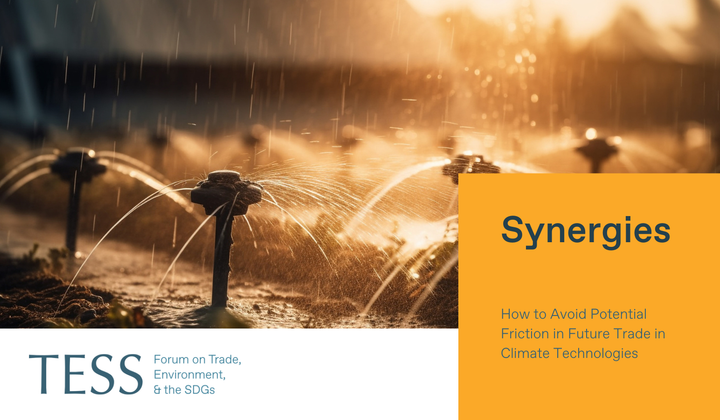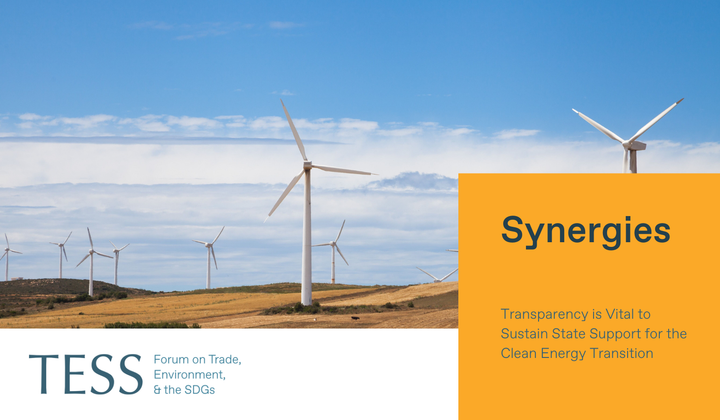At the 2023 UN Climate Change Conference (COP28), negotiations on global rules and disciplines for carbon markets collapsed. The unfinished business of establishing a regulatory framework for carbon markets could provide a new frontier for the trade and climate communities to bring coherence to this aspect of the trade-climate nexus, encompassing an expanding agenda that includes carbon pricing, carbon taxes, border adjustment measures, and fossil fuel subsidies
This article is part of a Synergies series on reviving multilateralism curated by TESS titled From Vision to Action on Trade and Sustainability at the WTO. Any views and opinions expressed are those of the author(s) and do not necessarily reflect those of TESS or any of its partner organizations or funders.
-----
The skeptical reception of the underwhelming pledge by major fossil fuel producing countries to “transition away” from production of this energy source dominated news headlines on COP28’s outcome. What was not widely reported was that negotiation of disciplines for the operation of carbon markets, including pricing and trading of carbon credits and offsets, was kicked down the road to COP29.
These negotiations collapsed over disagreements on regulatory parameters, transparency, and confidentiality of transactions. African delegations were prominent in calling for stronger checks and balances and loosening of confidentiality causes that would prevent scrutiny. In response to the deferment, independent carbon crediting standards agencies led by Verra issued a statement in Dubai to announce a collaborative initiative to promote transparency and consistency across the market. While the statement was a timely recognition of the inadequacies of current approaches, which inconsistencies in the activities of the agencies have revealed, the negotiation of disciplines for multilateral regulation of carbon markets as required under Article 6 of the Paris Agreement remains unfinished business in the COP process.
Operation of Carbon Markets – Not Yet Optimal
The challenges related to carbon market operations are well-known and include:
- Greenwashing: Where a business exaggerates its efforts to offset emissions while continuing environmentally harmful practices. Verra’s Northern Rangeland Trust scandal continues to shake the confidence of investors and carbon market watchdogs.
- Community rights: Where local communities might find themselves marginalized as carbon market projects are implemented, resulting in a lack of consultation, inadequate compensation, and often displacement. Shmid’s research on the Bukaleba forest reserve in Uganda revealed that the socio-economic development aspects in carbon contracts are simply not sufficient to protect indigenous land rights, even when these rights are legally recognized.
- Non-transparency: Where companies like the UAE-based Blue Carbon insist on the confidentiality of contract terms for land acquisitions across Africa, raising opacity concerns. This hinders the ability of stakeholders to assess the expected impact and promised benefits.
For Article 6 objectives to be realized, accountability and transparency must be built into the design of robust oversight systems for the functioning of carbon markets. These systems must also safeguard the rights of local communities and ensure effective impact on emission reductions. This is the unfinished task that remains before COP negotiators.
High Stakes for African Countries
For the African countries, the stakes on carbon markets that work effectively are high. Not only does carbon trading offer a new source of non-debt creating financial flows, but the continent also possesses unique assets and untapped potential for climate stabilization. It is to this end that the African Carbon Markets Initiative (ACMI) was launched at COP27 to work with African governments in cohering national approaches and ensuring high-integrity carbon markets
For the African countries, the stakes on carbon markets that work effectively are high. Not only does carbon trading offer a new source of non-debt creating financial flows, but the continent also possesses unique assets and untapped potential for climate stabilization.
From the outset, ACMI has put much emphasis on the equitable and transparent distribution of carbon credit revenue with a significant portion of the receipts going to communities. This is to ensure that carbon trading benefits communities on the ground and also provide a critical source of climate finance for the continent. Carbon markets are currently estimated to be worth some $2 billion with potential to reach S1 trillion by 2037 according to BloombergNEF. This is a multiple of the $100 billion in annual climate finance commitment agreed at COP15 in Copenhagen in 2009 and yet to be achieved.
The ACMI’s economic modelling projects steady growth in Africa’s carbon market transactions during the next 30 years with the retirement of up to 2.5 gigatonnes in CO2 emissions, mobilization of up to $200 billion a year in carbon trades, and creation of up to 190 million green jobs by 2050. It must be acknowledged that these projections could be upended by advances in carbon removal technologies. But even with any such advance, analysts expect that ultimately, a combination of verifiable avoidance and removal projects will be necessary. The focus is expected to be on the quality of both types of credit as the market continues to mature.
It should be recalled that the continent is home to the Congo Basin, a vital carbon sink storing over 30 billion metric tons of carbon. This surpasses the combined tropical forests of the Amazon and Asia. The continent is further endowed with a variety of ecosystems that are natural carbon sinks. These encompass oceans, forests, grasslands, and soil. Yet, Africa's monumental contribution to climate equipoise remains undervalued in carbon market trades. The continent accounts for just 11% of the world's recorded carbon offsets and 2% of global carbon market trading.
Moreover, the pricing of African carbon credits is relatively low. While the IPCC recommends a base price of $100 per tonne to maintain a safe 1.5°C warming limit, African credits currently fetch as little as $10/tCO2, significantly lower than in Europe and the United States. Increasing, both the price and volume of credits is a fundamental ACMI priority. In the Nairobi Declaration adopted at the September 2023 Africa Climate Summit that preceded COP28, African leaders called for measures that “elevate the continent’s share of carbon markets.” Innovations such as debt-for-nature swaps as in the Seychelles and Gabon have been welcomed.

Land use changes are an important consideration for carbon markets as well as a constraint on modern development.
Far-Reaching Implications
Global rules and disciplines for carbon markets under Article 6 could impact both compliant carbon markets that rely on taxes and price-based voluntary markets that trade in carbon credits. This will have far-reaching implications for the design of trade measures that seek to control the risk of leakage between production systems that are subject to different regulatory standards and obligations for carbon emissions. While the much-heralded “Trade Day” at COP28 may have helped to raise awareness of trade policy issues that intersect with climate, multilateral trade and climate discussions remain siloed. In looking ahead to COP29, the unfinished business on Article 6 could provide a new frontier for the trade and climate communities to bring coherence to this aspect of the trade-climate nexus, encompassing an expanding agenda that includes carbon pricing, carbon taxes, border adjustment measures, and fossil fuel subsidies. These require both urgent attention and coordinated approaches.
Global rules and disciplines for carbon markets under Article 6 could impact both compliant carbon markets that rely on taxes and price-based voluntary markets that trade in carbon credits.
Media coverage of COP28 headlined the incredulous response to a vacuous promise to move away from fossil fuels that is the main driver of the climate emergency. Much better received was the reporting on more substantial COP28 achievements such as the loss and damage fund (which remains underfunded), the compact on curbing methane gas emissions, and the Global Stocktake (which provided a welcome emphasis on human rights-based approaches to the multiple impacts of climate change including on food security, health, water systems, and biodiversity). The laboured negotiations to ensure transparency and robustness in markets for carbon trading were ignored. Finishing this business at COP29 will generate the headlines it deserves and affirmation that the multilateral path does work.
-----
David Luke is Professor in Practice, Firoz Lalji Institute for Africa, London School of Economics and Political Science.
Cecilia Wandiga is Executive Director, Centre for Science and Technology Innovations, Nairobi.
-----
Synergies by TESS is a blog dedicated to promoting inclusive policy dialogue at the intersection of trade, environment, and sustainable development, drawing on perspectives from a range of experts from around the globe. The editor is Fabrice Lehmann.
Disclaimer
Any views and opinions expressed on Synergies are those of the author(s) and do not necessarily reflect those of TESS or any of its partner organizations or funders.
License
All of the content on Synergies is licensed under a Creative Commons Attribution-NonCommercial-ShareAlike 4.0 International (CC BY-NC-SA 4.0)
license. This means you are welcome to adapt, copy, and share it on your platforms with attribution to the source and author(s), but not for commercial purposes. You must also share it under the same CC BY-NC-SA 4.0 license.
If you would like to reuse any material published here or if you have any other question related to Synergies, send an email to fabrice.lehmann@graduateinstitute.ch.



